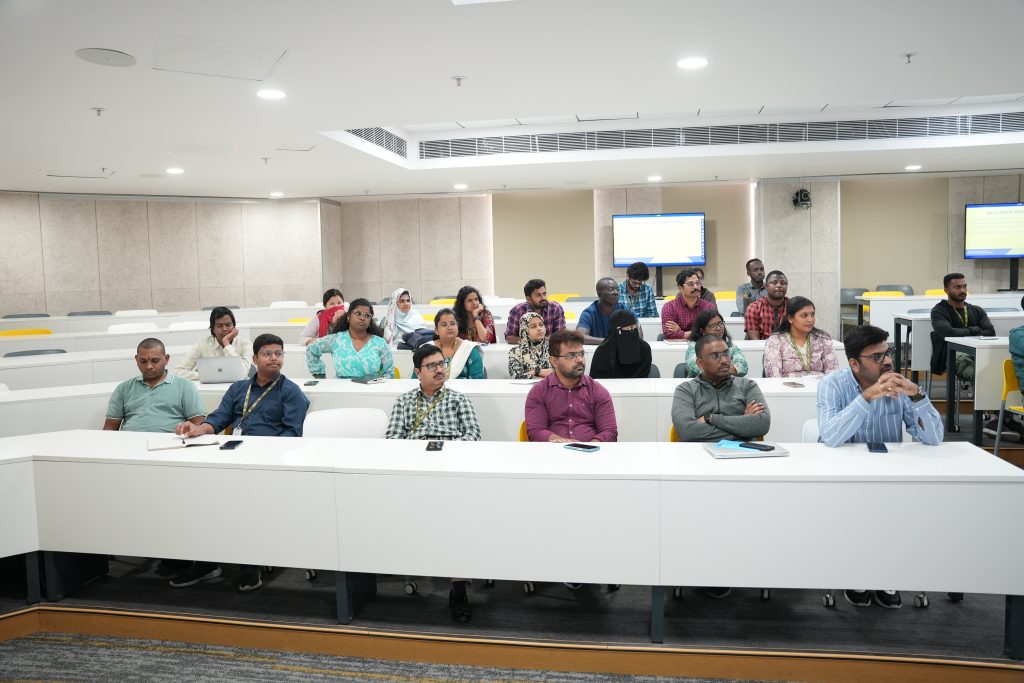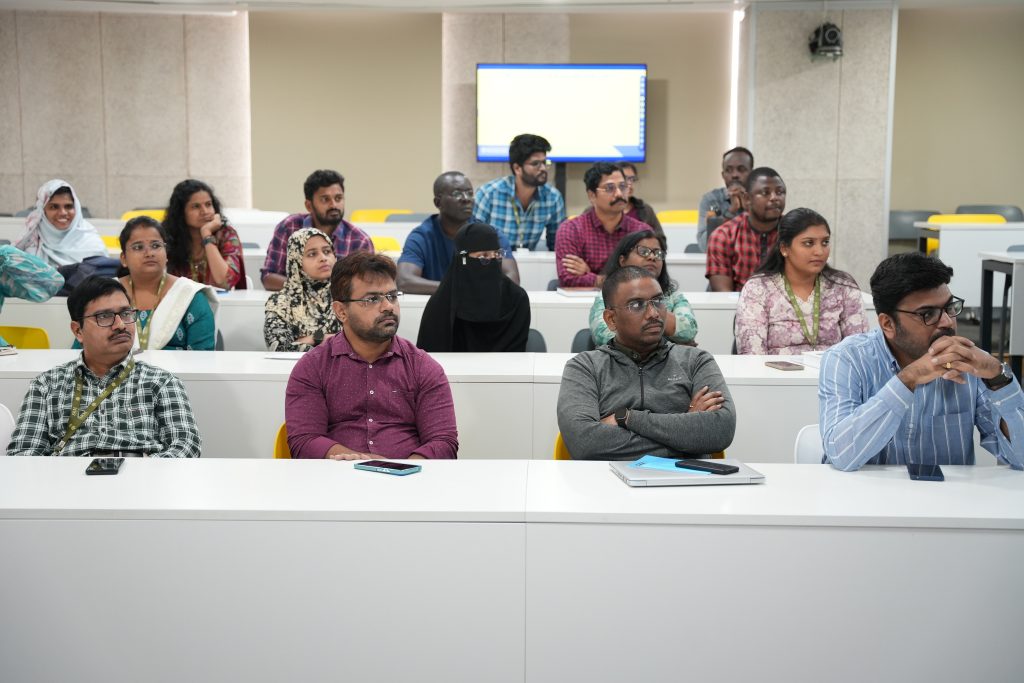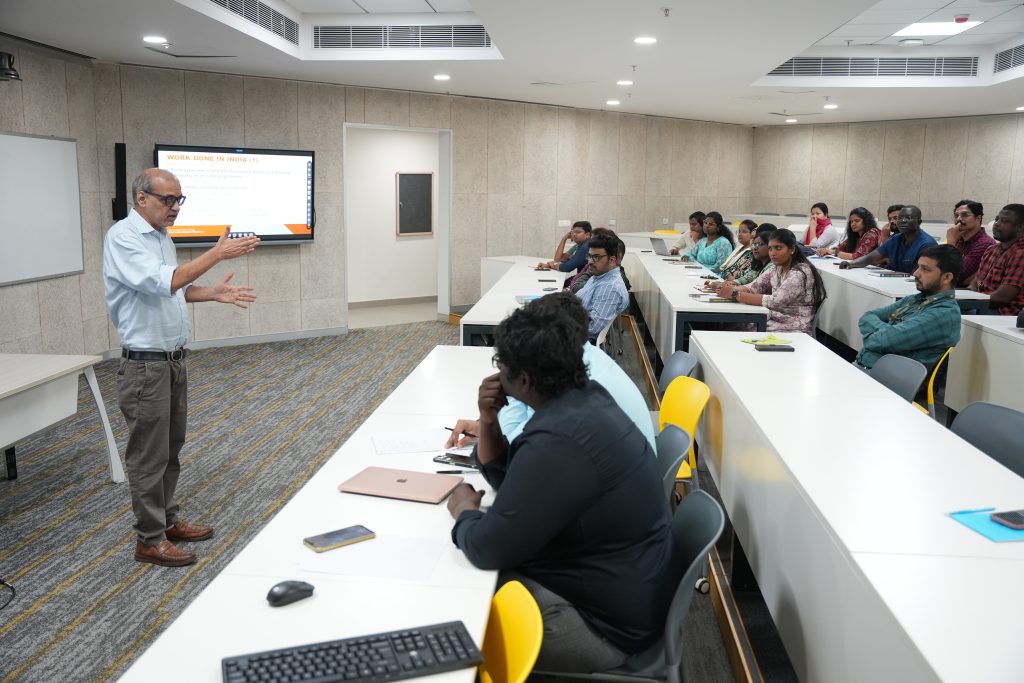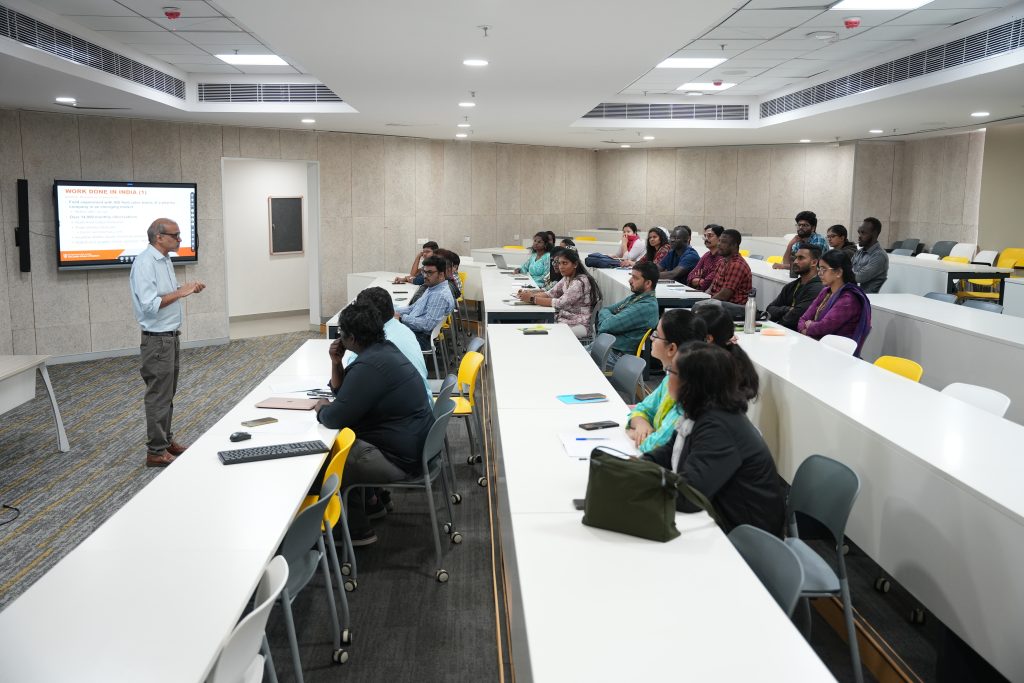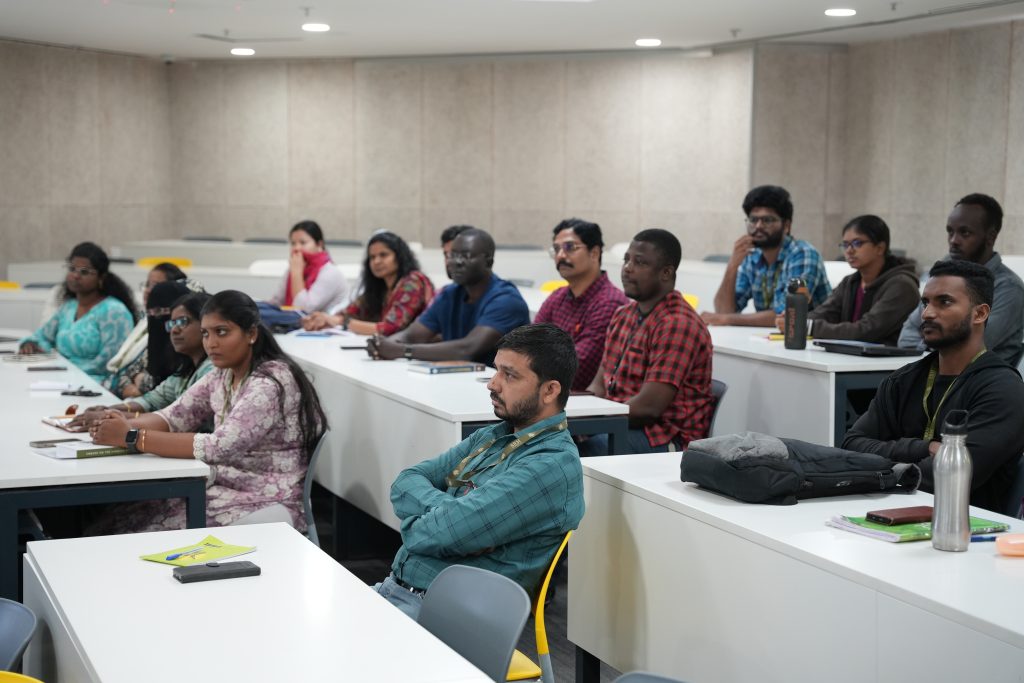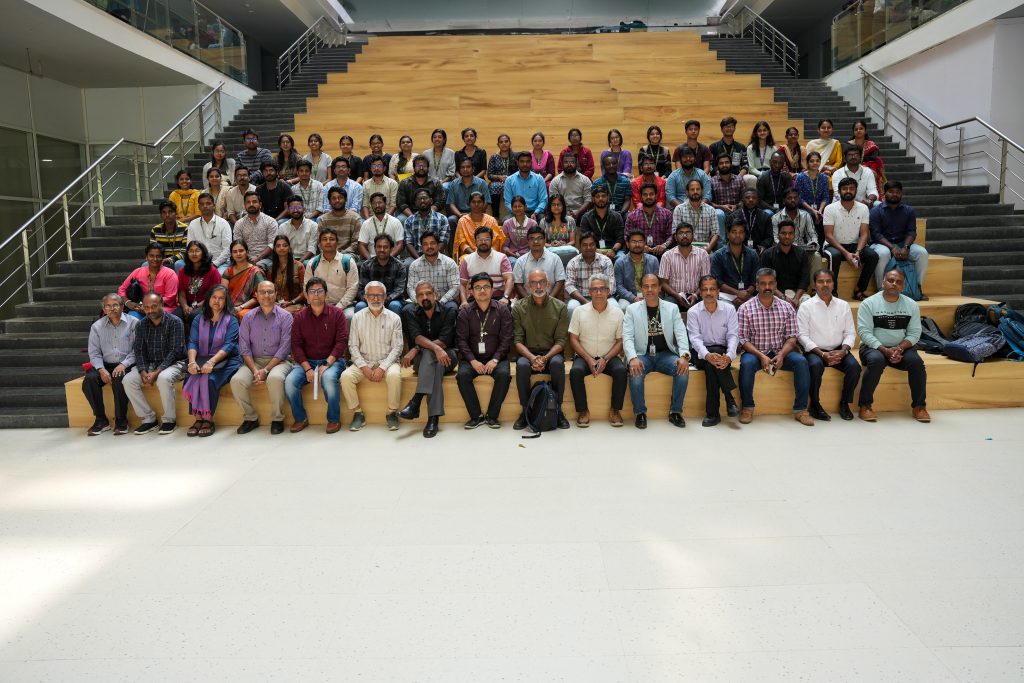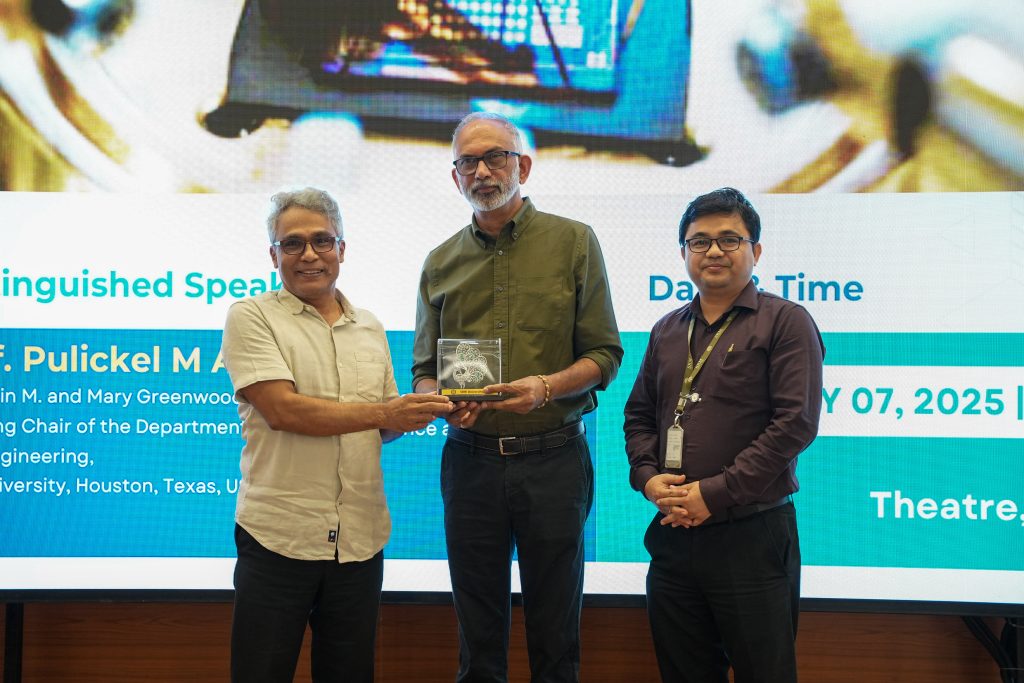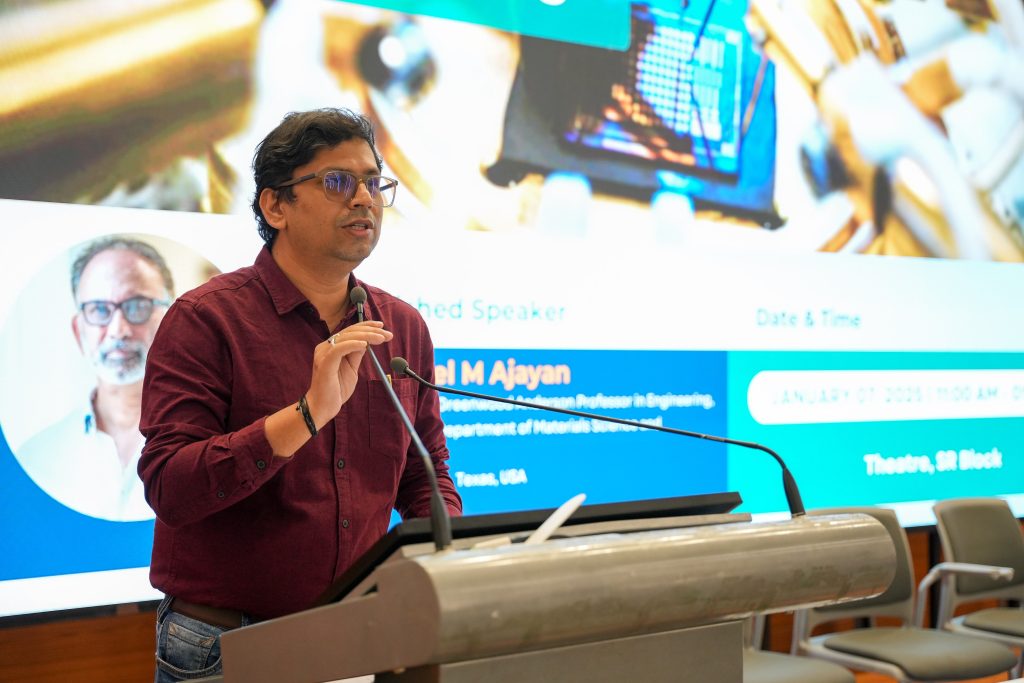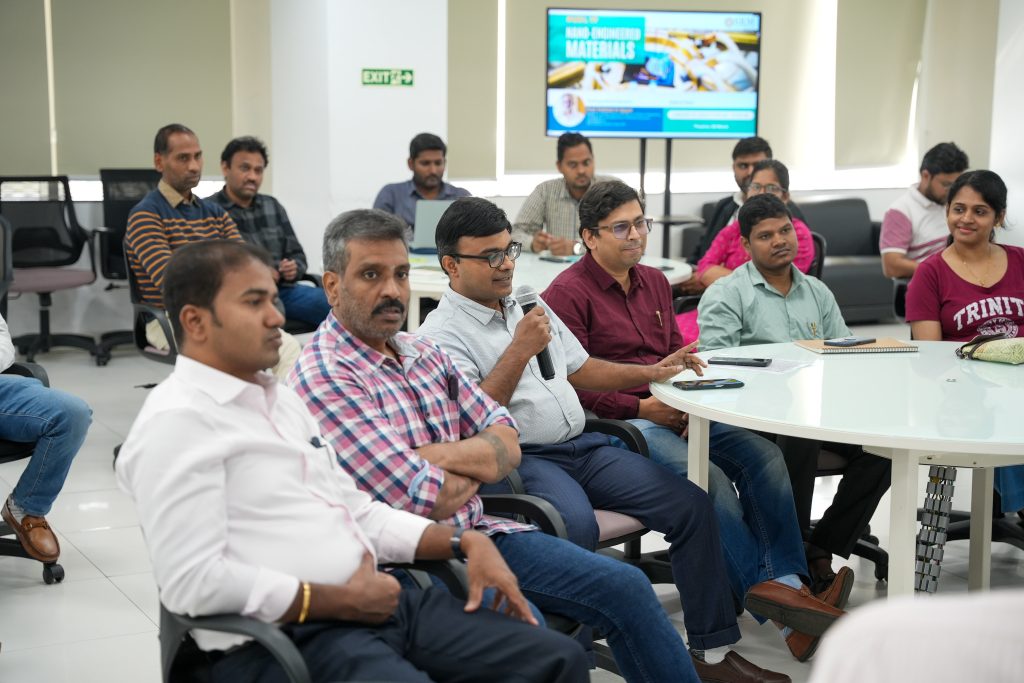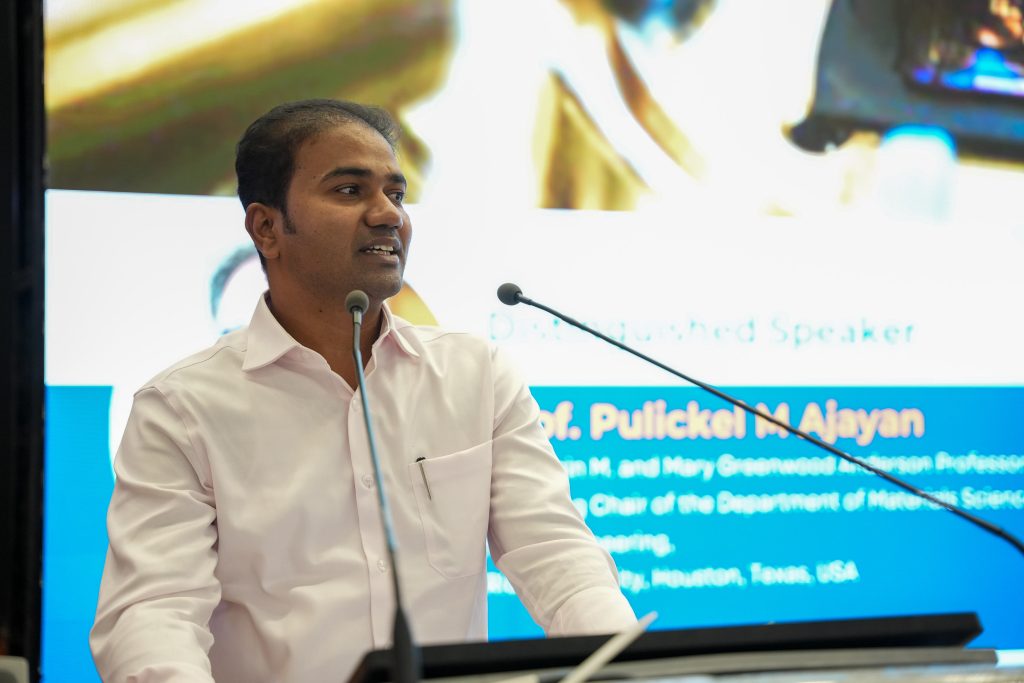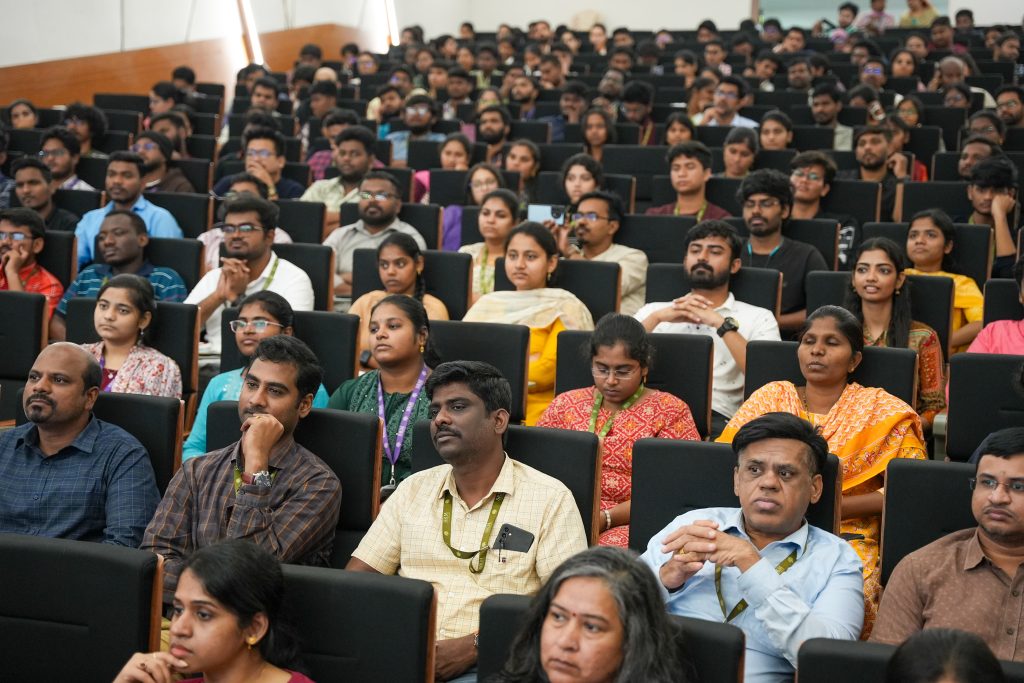- Lecture on Experimental Research Design by Prof. C Raghunath January 16, 2025
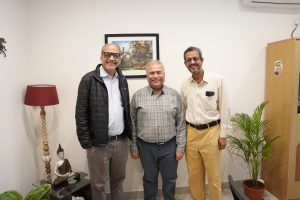 The Department of Management under the Paari School of Business organised an engaging interactive session with Faculty and PhD Scholars on Experimental Research Design. The session was addressed by Prof. Raghunath Singh Rao, Professor of Marketing at UT, University of Texas, Austin. The event provided an insightful discussion on Marketing Research where Prof. Raghunath Singh Rao shared personal insights on his research and experiments conducted in India since 2014.
The Department of Management under the Paari School of Business organised an engaging interactive session with Faculty and PhD Scholars on Experimental Research Design. The session was addressed by Prof. Raghunath Singh Rao, Professor of Marketing at UT, University of Texas, Austin. The event provided an insightful discussion on Marketing Research where Prof. Raghunath Singh Rao shared personal insights on his research and experiments conducted in India since 2014.During the session, Prof. Rao discussed a specific experiment in the healthcare sector, highlighting the necessity of preventive healthcare in rural areas. He also presented findings from an experiment focused on the role of incentives for medical representatives and how these incentives influence their performance and sales strategies. His expertise on designing and implementing field experiments in India, offering practical insights and methodologies for conducting impactful research in the Indian context.
The outcome of the programme was two-fold. First, participants learned how to conduct in-field experiments addressing practical problems in India. Prof. Raghunath Singh Rao provided a framework for identifying relevant issues and designing experiments that can yield actionable insights. Second, attendees gained a comprehensive understanding of effectively conducting these experiments. Key points emphasised included the importance of clear objectives, selecting appropriate control and treatment groups, ensuring ethical considerations, and maintaining rigorous data collection and analysis methods. Prof. Rao also highlighted the need for adaptability in the field, considering local contexts and potential challenges. Additionally, the session covered how to conduct research through mathematical models, providing a robust approach to analysing complex data and deriving meaningful conclusions. This knowledge equips researchers with the tools to design and implement impactful field experiments, ultimately contributing to solving real-world problems in India
Continue reading → - Arun Kumar January 9, 2025
- Patent on SQL Free Database Interaction January 9, 2025
This research, by Dr Ashu Abdul, Assistant Professor and research scholar Ms Surya Samantha Beri along with forth-year student, Mr Jakkampudi Venkatasubbaiah from the Department of Computer Science and Engineering explores a framework designed to help users retrieve and analyse data without requiring any Structured Query Language (SQL) knowledge. The patent titled, “System and Method for Generating Structured Queries from Natural Language Inputs , with application no: 202441096460 is particularly relevant as it enables individuals, like a car dealer seeking sales insights, to interact with their databases using everyday language. Such accessibility underscores the importance of this research in democratising data access for all users.
Abstract:
This project is centred around creating a framework that translates user queries into SQL statements and retrieves results without requiring any SQL knowledge from the user. By delving into the workings of various RDBMS systems, with a special focus on MySQL, I developed a solid understanding of database architecture and how databases are engineered for optimized performance. This knowledge was critical in designing a system that can seamlessly interact with any given database, analyse it, and provide relevant results in response to user input.
About the Framework:
This framework is intended to convert the user queries into SQL statements and attain the results from the database without intervention of SQL coding. Every time writing multiple SQL commands to apply filters, commands, and extracting data is time-consuming and requires having knowledge of SQL knowledge. This project is intended to analyze a database and answer the questions that are related to a particular database without writing SQL commands.
Explanation in Layperson’s Terms:
In-General we rely on programmers who are efficient in programming SQL for finding the insights from the database which are related to business or information. So, Laymen cannot access data without knowing SQL this project makes it possible. Assume, Mr. A a car dealer owns a showroom has a software dealing with his Business he wants to access his data and get insights for understanding the sales. Now he is not familiar with using SQL so he relies on someone for that or opens software and applies multiple filters to analyze his data. But What if he can use a chatbot and get solutions for all his questions from his database?
Mr.A can get conclusions from his data within no-time that thought represents this entire project.What are the use cases of this framework to a layman?
Laymen interaction with the database for understanding their data. Reducing the requirement to understand and search for the filters in the front-end. Faster data extraction from the database. Generating the results based on user queries in natural language without SQL coding. Elimination of time and efforts required for writing SQL Commands or applying filters. Understanding data gets easier for engineers as well as unknown data can be understood easily.
Practical Implementation:
This project has been successfully integrated into several existing real-time applications, enabling precise identification of data locations. By fine-tuning and enhancing our algorithms, we have achieved significant improvements in accuracy. In practical terms, users can effortlessly explore and comprehend their data.
Furthermore, extensive testing across databases of varying sizes has demonstrated the project’s ability to deliver significant and well-structured results.
Future Enhancements:
Incorporating Natural Language Processing (NLP) to process and respond to queries in users’ native languages, including speech-to-text capabilities.
Facilitating the generation of dynamic reports in various formats such as PDFs and Excel sheets.
Expanding compatibility to support additional database systems like Oracle, PostgreSQL, and NoSQL models.
Enabling data extraction and analysis from Excel sheets and CSV files.
Continue reading → - ETOT 2024 : Advancing Optical Technology in India January 9, 2025
The Department of Physics organised the International Conference on Emerging Trends in Optical Technology (ETOT 2024), showcasing the latest advancements in the field of Optical Technology. The conference featured esteemed chairpersons Prof. R P Singh and Prof. Achanta Venugopal, alongside distinguished dignitaries including Registrar, Dr R Premkumar, Dean-SEAS , Prof. C V Tomy, and Dean-Research, Prof. Ranjit Thapa.
In his inaugural address, Dr Gangi Reddy Salla, Associate Professor and programme convenor from the Department of Physics, emphasised the vital role of Optical Technology in contemporary society. He stated, “This conference serves as a crucial platform for discussing the emerging trends and innovations in Optical Technology, reflecting its significance in various sectors today.”
The conference hosted 62 distinguished speakers from India and abroad, receiving a total of 103 abstracts, with 40 contributions from the university across various departments. As an association with IOP Proceedings, special acknowledgment will be featured in its upcoming issue. Additionally, the conference was generously supported by sponsors exceeding 10 lakhs, including notable companies such as ANRF, ATOS, Advanced Photonics,AIMIL and CIPHR and the University of Tartu. OPTICA also endorsed this significant event.
During the proceedings, five exemplary paper awards were announced in honour of the conference chairperson Prof. R P Singh. In his welcome address, Prof. C V Tomy remarked, “Despite being only seven years old, the university has made significant strides in research, this conference is testimonial to the varsity’s research excellence and will not just pave way for advancements in the field of optical technology, but will also fosters collaboration between industry leaders and academic experts.”
Prof. Achanta Venugopal highlighted the pressing need for a uniform curriculum in Optics and Photonics nationwide. He expressed concern over the lack of fabrication laboratories to expand research possibilities, saying, “Conferences like these can significantly impact our field by addressing the necessity for such facilities, prompting governmental action to support our academic aspirations.”
Prof. R P Singh urged attendees to broaden their research applications beyond academic papers, particularly in fields such as Agriculture and Medicine. He stated, “The utilisation of optical technologies can revolutionise these sectors, and it is essential for our research to resonate with real-world challenges and reach those in need.”
The event concluded with the recognition of the chairpersons by Registrar Dr R Premkumar, Dean-SEAS, Prof. C V Tomy, and Dean-Research, Prof. Ranjit Thapa. The release of the abstract book marked another highlight of the conference, with Dr Ravi Kumar delivering the vote of thanks. The event also featured insightful presentations and discussions from prominent speakers representing renowned institutions both in India and internationally.
Continue reading → - Renowned Nanoscientist Prof. Pulickel M Ajayan Delivered UDL#19 January 8, 2025
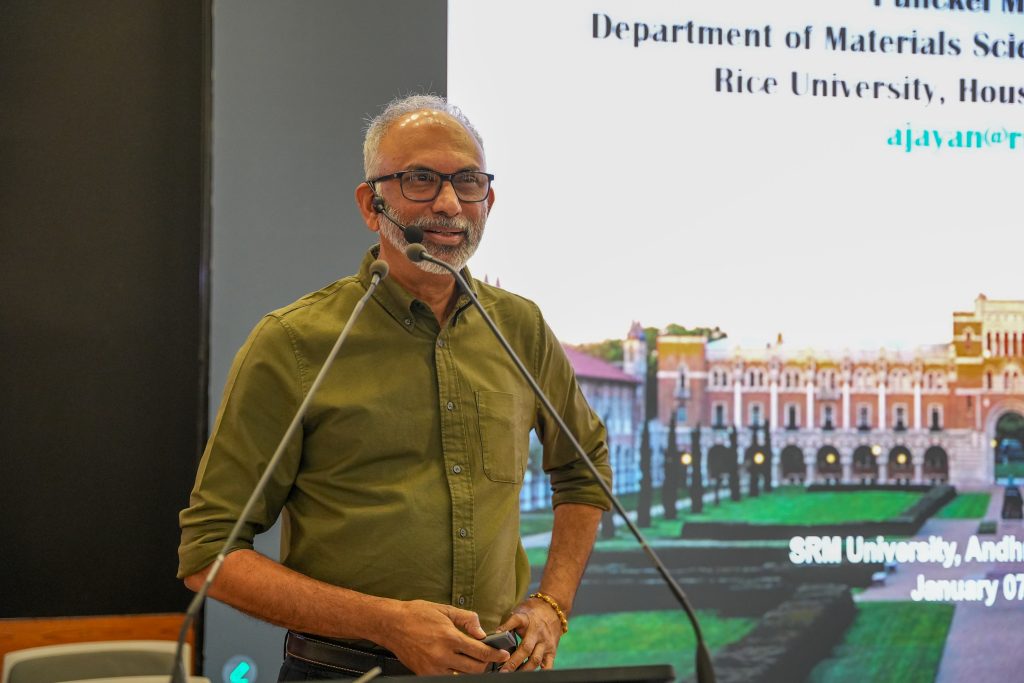
“Engineering very small things, structures less than 10nm, is challenging – and this is my biggest interest.” – Prof. Pulickel M Ajayan.
The university hosted its nineteenth edition of the University Distinguished Lecture, featuring a celebrated talk on “Nano-Engineered Materials” by eminent scientist Prof. Pulickel M Ajayan, Benjamin M. and Mary Greenwood Anderson Professor of Engineering and Founding Chair of the Department of Materials Science and Nanoengineering at Rice University, Texas, USA on January 07, 2025. A pioneer in nanotechnology with a noteworthy career extended to three decades, Prof. Ajayan’s session elucidated the recent developments in nanotechnology, particularly in relation to the challenges in designing and controllably synthesising functional nano-engineered materials.
Prof. Ajayan spoke extensively on the three major key points – Atomically Thin Layers (2D) Vertical and Lateral Heterostructures, Defects & Single Atoms and Printed 3D Nano-architectures & Nanocomposites. “Three decades ago, nanotechnology or nanomaterial science was just emerging. Today, it has become an enabling technology with fundamental developments in controlled manufacturing of nanomaterials,” remarked Prof. Ajayan in his lecture. He proceeded to elucidate the various phases of nanotechnology – the first phase, where scientists worked on the fundamental understanding of material synthesis, controlled fabrication, etc.; the second phase of integrating nanotechnology into potential devices; and the current phase of high-tier development through commercialisation.
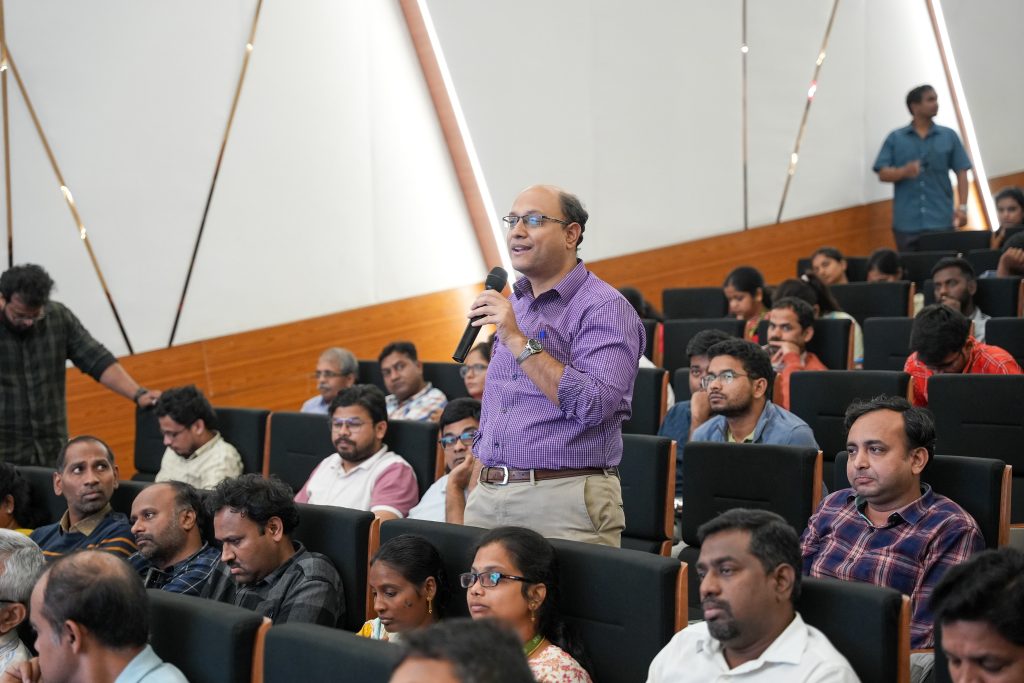
“A prominent figure in nanotechnology, Prof. Ajayan’s work in carbon nanotubes is exemplary in understanding the building of nano heterostructures. It is a privilege to have him share his wealth of knowledge on this remarkable occasion,” said Prof. CV Tomy, Dean – SEAS, in his welcome address. Prof. Ranjit Thapa, Dean – Research, also praised Prof. Ajayan for his contributions to nanoengineering and material science. Prof. Ajayan also had a brief interaction with the faculty regarding potential academic and research collaborations.
The 19th University’s distinguished lecture on nano-engineered materials ignited genuine curiosity about the field among the participating students. The profile of Prof. Pulickel M Ajayan and his astounding research portfolio motivated both faculty and students to explore nanoengineering and material sciences. The 19th UDL was graced by the presence of Registrar Dr R Premkumar, Deans of various schools, faculty from various streams and students of the varsity. The UDL series is a testament to the university’s passion for research and commitment to place SRM AP in the frontiers of academic and research excellence.
Continue reading →


